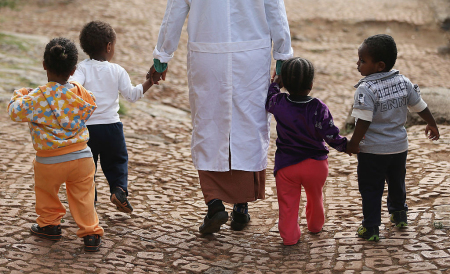Child welfare ministries urge churches to help pandemic orphans

New Delhi : The Covid-19 pandemic that led to the deaths of more than 4 million people worldwide also caused a spike in the number of children who are now orphaned, a new report has revealed.
By April, over a year after countries worldwide were hit by the novel coronavirus pandemic, it’s estimated that as many as 1.5 million children younger than 18 years old had lost a mother, father, grandparent or caregiver who died of complications from COVID-19.
The report, titled “Children: The Hidden Pandemic 2021,” stresses that the implications of a pandemic are “lifelong and intergenerational.”
“The data on death and illness have clearly focused attention on the tragic and disproportionate burden among older adults — yet this has served to divert attention and understanding away from the needs of the world’s children,” the report reads.
Because of this, the report suggests that global and national responses should also focus on the children who’ve lost parents or caregivers to COVID-19.
Faith-based child welfare organizations that are part of the Faith to Action Initiative have responded to the report by noting that while it shows the circumstances of newly orphaned children worldwide, it fails to show the need to invest in family-based care and strengthen vulnerable families.
These groups, which include Christian Alliance for Orphans, Bethany Christian Services, World Without Orphans and Faith in Action, are encouraging churches to take action by financially helping families that are suffering such losses to ensure that children who lost one or more caregivers aren’t sent to orphanages, but instead can be cared for by surviving family or relatives.
Elli Oswald, executive director of Faith to Action Initiative, said the churches are best placed to carry out God’s intention for a loving family and “best placed” to respond to the orphaned children by ensuring “a child never needs to be placed in an orphanage.”
In a previous interview with The Christian Post, Oswald said the global crisis of orphaned children is a solvable problem and explained how care within an orphanage or children’s home is more expensive than supporting a family to care for a child.
“When you consider the costs of paid staff, facilities, all the direct needs of a child, as well as additional programming, it is easy to see how supporting children in families would be much less expensive,” she said. “In many parts of the world, impoverished families use orphanages as an economic coping mechanism — a way for families to secure access to services or better material conditions for their children. Consequently, residential facilities become an expensive and inefficient way to cope with poverty and other forms of household stress.”
Oswald also cited three studies that found residential care in South Africa and Central and Eastern Europe was four to 15 times more expensive than reintegration or transitioning a child back into their family.
The new wave of orphans as a result of COVID-19 “is devastating and highlights the need for a massive global response,” said Karmen Friesen, principal coordinator for World Without Orphans, in a statement shared with CP. “But this time — unlike in previous emergencies — we have the opportunity to get things right, because we know what works.
“Now is the time to invest in strengthening families and developing family care, not orphanages,” she added. “And around the world, it is churches that are ideally placed to provide the wrap-around support that families in crisis urgently need.”
Chris Palusky, president and CEO of the adoption agency Bethany Christian Services, said all children “have a God-given right to grow up in the love and care of a family.”
The solution for the 1.5 million orphans, he said, is “the loving care of a family” instead of another orphanage.
“The Bible teaches followers of Jesus worldwide to care for orphans,” Palusky continued. “It also teaches Christians that God sets the lonely in families. … We urge Christians to support efforts to strengthen vulnerable families and communities, reunify families, and place children without caregivers in loving families, so that children never have to live in orphanages.”
Jedd Medefind, president of Christian Alliance for Orphans, reiterated how both Scripture and social science affirm the best place for a child to thrive is within a “safe, permanent, nurturing family.”
“This tragedy brings an immense challenge and an immense opportunity,” Medefind said. “The local church in every nation has both the calling and the community capable of making a world of difference — restoring broken families, strengthening struggling families, and welcoming children into new families whenever needed.”
The report was produced by the Centers for Disease Control and Prevention, USAID and World Without Orphans, along with global child welfare experts within the World Health Organization, World Bank and higher education institutions.






